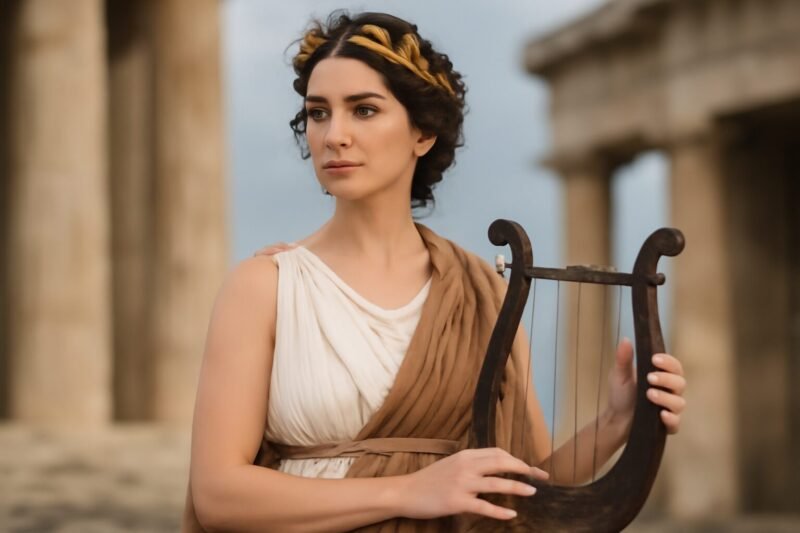Thelxinoe: The Enchanting Muse of Greek Mythology
Among the lesser-known but fascinating figures of Greek mythology is Thelxinoe, one of the Muses—the divine inspirers of the arts, sciences, and creativity. Though her name is not as widely recognized as some of her sisters, such as Calliope or Terpsichore, Thelxinoe holds a unique place in the pantheon of Greek deities.
Role and Significance
Thelxinoe, whose name translates to "Charming the Mind" or "Heart-Delighting", was associated with the power of enchantment through music and song. She was believed to inspire poets and musicians, filling their works with irresistible beauty. Some traditions suggest she was specifically linked to the soothing and persuasive qualities of sound, making her a muse of lyrical and melodic arts.
Origins and Relationships
Like her fellow Muses, Thelxinoe was a daughter of Zeus, the king of the gods, and Mnemosyne, the Titaness of memory. She was one of the original three Muses in early traditions, alongside Aoede (song) and Melete (practice), though later accounts expanded their number to nine. Thelxinoe’s presence in mythology highlights the Greeks' reverence for the transformative power of music and poetry.
Powers and Influence
Thelxinoe’s domain extended beyond mere inspiration—her voice and influence were said to have a magical quality, capable of calming storms, healing sorrow, or even swaying the hearts of gods and mortals alike. In some myths, she was invoked by bards seeking to craft songs that could move listeners to tears or joy. Her connection to enchantment also tied her to the mystical aspects of language and sound, bridging the gap between art and divine power.
Legacy and Worship
Though not as prominently worshiped as other Muses, Thelxinoe’s legacy endured in the cultural appreciation of music’s emotional and persuasive power. Shrines to the Muses often included her among their honored number, particularly in regions where poetry and song were central to religious and civic life. Her name and essence remind us of the ancient belief that art was not just entertainment, but a force capable of shaping reality itself.
Alternative Names for Thelxinoe
God Name: Thelxiepeia (Greek)
An alternative name for Thelxinoe, often associated with one of the Sirens in Greek mythology. The name means 'soothing words' or 'enchanting speech,' reflecting the Sirens' ability to lure sailors with their songs.
God Name: Aglaopheme (Greek)
Another name linked to Thelxinoe, also associated with the Sirens. It translates to 'splendid speech' or 'glorious voice,' emphasizing the captivating nature of their songs.
God Name: Thelxiepia (Roman)
The Roman adaptation of the Greek name Thelxiepeia, maintaining the same connotations of enchanting speech and often used interchangeably in Roman interpretations of the Sirens.
Tales about Thelxinoe
Thelxinoe and the Healing Melody of Asclepius
In the sacred groves of Asclepius, where the air hummed with the promise of renewal, Thelxinoe’s enchanting voice often drifted through the cypress trees. As one of the Muses of music and delight, her songs were said to soothe even the most troubled souls. One evening, she encountered a weary Asclepius, the god of healing, who was struggling to ease the suffering of a plague-stricken village. His remedies had stalled, and despair clung to the air like a shroud.
A Harmonious Cure
Thelxinoe approached with a lyre in hand, her melody weaving through the grove like a gentle breeze. She sang of resilience and vitality, each note imbued with a mystical energy that seemed to amplify Asclepius’s healing powers. Inspired, he combined her music with his herbs and incantations, creating a symphony of restoration. The villagers, once listless, rose with renewed strength, their ailments fading as Thelxinoe’s voice crescendoed. From that day forward, Asclepius honored her as a partner in healing, and their collaboration became legend—a testament to how art and medicine could unite to mend both body and spirit.
Thelxinoe’s Lullaby for Hypnos
Deep in the realm of dreams, where shadows danced and whispers echoed, Thelxinoe once ventured to seek the aid of Hypnos, the personification of sleep. The mortal world was restless, plagued by insomnia and nightmares, and even Hypnos’s gentle touch seemed to falter. Thelxinoe, with her gift for captivating song, offered to assist the weary god.
Whispers of Slumber
As Hypnos sprinkled his sleep-inducing poppies, Thelxinoe began to sing—a soft, hypnotic lullaby that wove through the darkness like silk. Her voice, rich with the magic of persuasion and charm, calmed the turbulent dreams of mortals and eased Hypnos’s burden. Together, they crafted a new kind of sleep, one filled with peaceful visions and restorative silence. Grateful, Hypnos gifted her a feather from his own wings, symbolizing their eternal alliance. To this day, it is said that Thelxinoe’s melodies still linger in the quiet moments before sleep, guiding souls into Hypnos’s embrace.
Frequently Asked Questions
Who is Thelxinoe in Greek mythology?
Thelxinoe is one of the lesser-known Greek deities, often considered one of the Sirens, who were enchanting creatures known for their beautiful singing that lured sailors to their doom. She represents the power of music and voice in mythology.
What does the name Thelxinoe mean?
The name Thelxinoe translates to 'enchanter' or 'soothing voice' in Greek, reflecting her association with the Sirens' captivating songs that could charm and deceive listeners.
Why is Thelxinoe important in Greek mythology?
While not a major figure, Thelxinoe symbolizes the dual nature of art and persuasionu2014how beauty and creativity can be both alluring and dangerous, a theme prevalent in many Greek myths.
How does Thelxinoe's story apply to modern life?
Thelxinoe's myth serves as a metaphor for the seductive power of media, advertising, or even toxic relationships, reminding us to be cautious of what or who we choose to follow blindly.
Are there any lessons to learn from Thelxinoe's myth?
Yes, her story teaches about the consequences of succumbing to temptation without critical thinking, emphasizing the importance of discernment in the face of persuasive influences.













